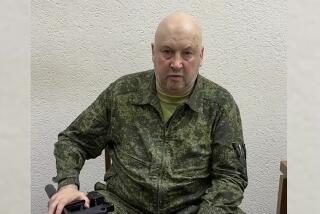Page 1 in Pravda : KGB Says It Fired Official for Cover-up
- Share via
MOSCOW — In an extraordinary step, the KGB disclosed Thursday that one of its senior officers in the Ukraine has been fired for plotting to cover up the misdeeds of local party and government officials.
The admission of misconduct, written by KGB Chairman Viktor M. Chebrikov himself, was displayed on the front page of the newspaper Pravda, the main organ of the Communist Party Central Committee.
Publication of Chebrikov’s words signaled that not even the once-sacrosanct Committee on State Security--the secret police, or KGB, its initials in Russian--is immune from criticism under the anti-corruption campaign of Soviet leader Mikhail S. Gorbachev.
It also fits in with Gorbachev’s campaign of glasnost , or openness, which has resulted in the public discussion of problems that in the past were swept under the rug.
The KGB chairman’s account involved the unjustified arrest and two-week detention of a Soviet journalist who had been exposing official wrongdoing in the Voroshilovgrad area of the Ukraine.
Chebrikov’s disclosure that a local KGB man had been responsible for the journalist’s treatment contrasted with past accounts of how it was often necessary to call in the KGB to deal with corruption when the local police failed to do the job.
Western diplomats said officials of the feared KGB have not come under public criticism since the 1950s, when Lavrenti P. Beria was denounced, and later executed, for his terror tactics. The diplomats said the self-criticism in Chebrikov’s article was without precedent.
The KGB chief said in Pravda that officials of the Ukrainian division of the KGB committed “violations of socialist legality” by persecuting a journalist.
Magazine Bureau Chief
Chebrikov said that a KGB official, identified only as A. Dichenko, wrongfully directed the Voroshilovgrad police to arrest Viktor B. Berkhin, 56, the Donetsk bureau chief of the magazine Soviet Miner.
In an earlier story, Pravda had reported that Berkhin was seized by the police in Donetsk, subjected to a five-hour search of his apartment, taken to Voroshilovgrad at midnight and questioned until dawn on allegations of hooliganism--a standard Soviet legal charge that covers a multitude of anti-social acts.
The “laughable” charge against him, Pravda said, was that he appeared in a hotel corridor wearing only his undershirt. Pravda said that Berkhin had not been alone in exposing official corruption and that he was arrested and interrogated in an effort to elicit incriminating information about another writer, who worked for Pravda.
“It is evident,” the paper said, “that too much dirt has accumulated under the carpet in Voroshilovgrad, and its guardians have become too energetic about keeping it there.”
‘Decided to Fabricate’
Berkhin told Pravda that the authorities “couldn’t find any criminal case implicating (the Pravda writer), so they decided to fabricate one. But I could not agree to perjury.”
According to the newspaper, Berkhin said a police official told him, “We hoped by daybreak you would hand us the Pravda correspondent on a plate.”
Although the earlier Pravda article named Dichenko as coordinator of the plot to squelch criticism of official wrongdoing, it identified him only as a minor Communist Party official. It did not mention that he was a KGB officer.
Chebrikov disclosed that Dichenko was head of the KGB in the Voroshilovgrad area. He said Dichenko planned Berkhin’s arrest and “involved several of his subordinates in illegal actions” against Berkhin and other citizens.
‘Dropped From the Ranks’
“For discrediting the high title of a Soviet officer, Dichenko has been relieved of his duties, dismissed from his job and dropped from the ranks of the KGB,” Chebrikov said.
“The chairman of the Ukrainian KGB has been instructed to take disciplinary action against other officers of the Ukrainian KGB for the Voroshilovgrad area . . . who committed illegal actions.”
The KGB, Chebrikov said, is taking additional measures to assure “strict observance of legality” in its activities.
More to Read
Sign up for Essential California
The most important California stories and recommendations in your inbox every morning.
You may occasionally receive promotional content from the Los Angeles Times.










